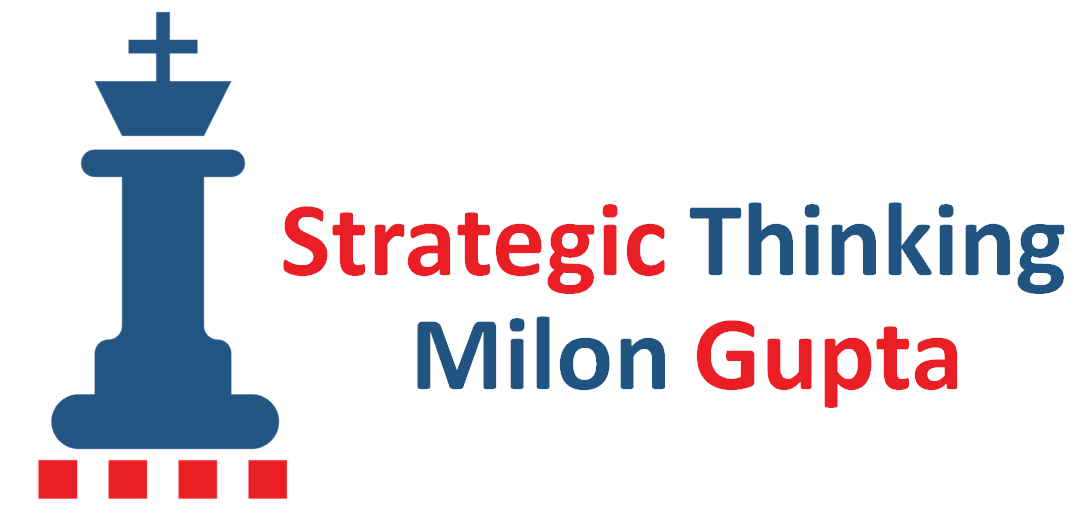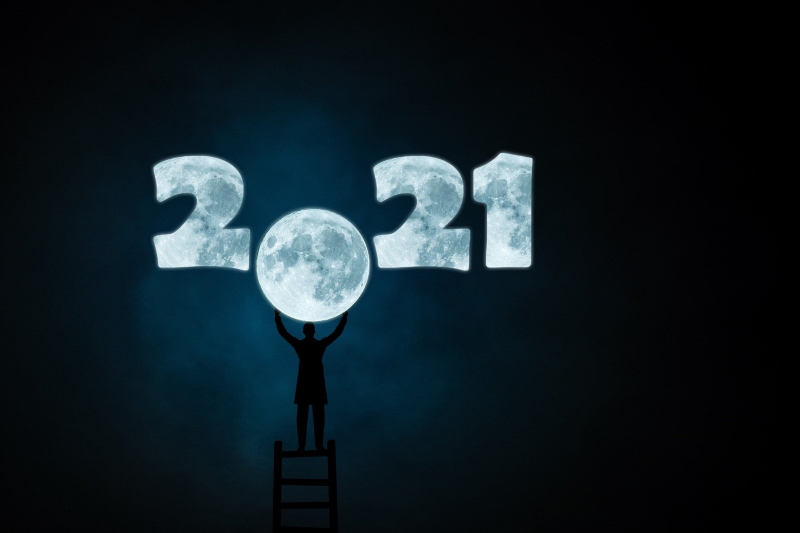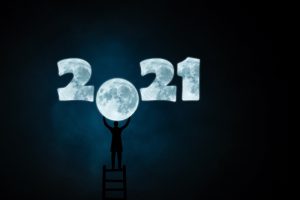In view of this, you might say that economic forecasts are pointless. If you expect from forecasts a precise and reliable picture of the future, I would agree. However, that is in my view not the point. Forecasts are rather about triggering your strategic thinking and planning for steering the uncertain space of possibilities we call future. In order not to raise false expectations of precise, reliable forecasts, I rather call it strategic foresight. The strategic foresight workshops I offer give participants a map of future possibilities and a good basis for strategic decisions – nothing more, nothing less.
 The following five business-relevant global trends I identified for 2021 are in this sense not a forecast but rather an invitation to explore the space of possibilities through strategic foresight. Decide for yourself, which of those trends might have an impact on your business, and – more importantly – what this impact could be.
The following five business-relevant global trends I identified for 2021 are in this sense not a forecast but rather an invitation to explore the space of possibilities through strategic foresight. Decide for yourself, which of those trends might have an impact on your business, and – more importantly – what this impact could be.
Trend 1: Corona pandemic
At least for the first half of 2021, I expect the Corona pandemic to have a strong short-term impact on the global economy and businesses around the world. Lockdown measures might continue beyond January. Only when vaccinations have reached a level considered to be satisfying by experts will the acute phase of the pandemic be over. Optimists expect this to happen by early summer. For some developed countries, this might be the case. In most developing countries, the level of vaccination and the immunity of the population against the virus could still be on a less satisfying level by summer. Nevertheless, I would expect the acute phase of the pandemic more or less to be over by summer.
Beyond the acute effects of the pandemic through lockdowns, there are also longer-term effects of the Corona crisis that will persist beyond the acute phase. In developing countries, it is expected that the level of poverty will remain significantly above pre-Corona levels for 2021 and beyond. In developed countries, we will see bankruptcies in sectors which suffered most during the crisis. In some sectors, there could also be a continued consolidation including a new wave of mergers and acquisitions. Among the more permanent changes induced by the pandemic could also be the increased number of employees working from the home office. At the same time, the level of business travel will probably remain below pre-Corona levels throughout 2021 – even in the second half of the year, when it might be possible again to travel without restrictions.
Trend 2: Climate change
In 2020, the effects of climate change have become quite obvious. Increased levels of bushfires in Australia and other parts of the world as well as the the average rise in temperatures are clear indicators. The tangible effects of climate change will continue and possibly even increase in 2021. The urgency of containing climate change and adapting to its effects will also increase. In 2020, there have been two major events that have prepared the ground for a stronger response to climate change. The first event was the US presidential election. The government of president-elect Joe Biden will return to the Paris climate agreement, which will give the global effort for containing climate change an additional push. The second event is the European Green Deal that was agreed in 2020. The European Union has committed to reducing net emissions of greenhouse gases to zero by 2050. The EU plans to mobilise at least 100 billion euro over the period 2021-2027 to achieve this goal. The crisis year 2020 has shown that radical changes are possible. In 2021, we might see some radical changes in the response to climate change become reality.
Trend 3: Smart technologies
A major factor in the transition to a more sustainable economy are smart technologies. They can help reduce greenhouse gas emissions and lower the consumption of natural resources in a circular economy. There are two major technologies that will enable the growing impact of smart technologies in all business sectors: artificial intelligence (AI) and 5G networks and services. The combination of AI and 5G will boost the Internet of Things (IoT), which will lead to novel business models and service offerings.
This trend toward smart technologies will continue to radically change a number of sectors in 2021, including transport, housing, and manufacturing. In transport and mobility, 2021 could be the year that will see a major push for e-mobility. In housing, the use of smart technology can help to increase the energy efficiency of buildings. In manufacturing, the factories of the future powered by 5G networks, AI and IoT will significantly reduce greenhouse gas emissions and optimise resource consumption. Obviously, all of this will not happen overnight. However, 2021 could be a year where many innovative smart technology solutions will be rolled out on a large scale.
Trend 4: Coopetition between China and the West
In 2020, the conflict between China and the West has escalated. The US government under president Trump had continued to pursue a tough course against China in trade negotiations and in technology matters, most notably in the area of 5G network technology and the ban of the world’s number one 5G technology provider Huawei from US 5G networks. Although the response by EU countries and other countries in the West has not been aligned with the US position, a pattern of more caution in dealing with China has emerged. The Chinese government under president Xi Jinping has benefitted from the West’s lack of political cohesion and the Corona-induced weakening of the Western economies. China is on its way to become the world’s major superpower. However, the high level of economic interdependence between the Chinese economy and Western economies limits the extent to which China can dominate the global economy.
In 2021, I expect a more cohesive response by the West in dealing with China’s superpower ambitions. President-elect Joe Biden is likely to keep the tough stance against China in economic matters. However, he will seek to coordinate the US China policy more with the EU and other Western partners. Thus, as China and the West are mutually dependent on each other, I expect to say a more balanced relationship between China and the West, which will be based on the goal of a productive coopetition.
Trend 5: Global economic recovery
In 2020, the Corona pandemic and the lockdowns to fight the pandemic caused an economic crisis of a dimension that exceeded the financial crisis of 2007-2008. Expert consider the recession of 2020 to be the worst since the end of the Second World War. In view of the severity of the crisis, a fast global economic recovery would be surprising. However, exactly that is what the OECD has predicted in its economic outlook in December 2020. The OECD predicts a global increase of the GDP by around 4.2% in 2021 and by 3.7% in 2022. This recovery will be supported, according to the OECD, by COVID-19 vaccine rollouts and accommodative fiscal and monetary policies. The OECD expects the recovery to be led by China, which is forecast to grow by 8% in 2021, accounting for more than one-third of world economic growth.
Despite this overall optimistic outlook towards 2020, the OECD has cautioned that the recovery will be uneven across countries. Countries with an effective COVID-19 response including rapid vaccinations are expected to perform relatively well. At the same time, GDP in many other countries is projected to remain below pre-crisis expectations.
There are many factors influencing to what extent the OECD forecast will come true. However, it appears extremely likely to me that we will see a strong economic recovery in 2021.
Conclusion
Please consider, how these five trends mean for your business. How severely has your business been affected by the Corona crisis? Or has your company benefited from the crisis? What challenges and opportunities will the fight against climate change offer you? Are you doing any business in China or with Chinese partners? How would changes in the business relations with China affect your business? How can you benefit from the economic recovery of your customers and business partners?


 There has been no business forecast for 2020 that came even close to what happened in this extraordinary year. At least I am not aware of any such forecast. Wildcard events like the Corona pandemic and its effects on society and economy are hard to predict for a specific year. Yes, there have been several warnings years ago that a global pandemic would strike and that we should get prepared. However, nobody knew when it would really happen.
There has been no business forecast for 2020 that came even close to what happened in this extraordinary year. At least I am not aware of any such forecast. Wildcard events like the Corona pandemic and its effects on society and economy are hard to predict for a specific year. Yes, there have been several warnings years ago that a global pandemic would strike and that we should get prepared. However, nobody knew when it would really happen.